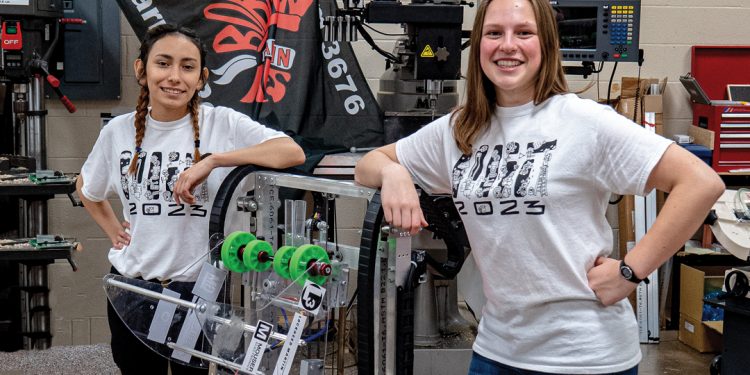When last we checked in on Trinity Stallins and Samantha Maldonado in the June 2019 cover story, the Arlington Martin STEM engineers were preparing for studies at the prestigious Massachusetts Institute of Technology. Here’s an update on the students, now sophomores – during a pandemic, no less …
Stallins says her experience has been filled with “learning things I never thought I’d want to know, trying things I never thought to try, and being supported more than I knew I could be. This is the first semester we have grades, so there’s a lot more pressure now than there was last year. The switch to online classes [because of COVID precautions] has definitely been an adjustment, but I don’t have a ‘normal’ semester to compare it to. I do know that I’m lucky it’s a small school because I have people I know in all of my classes which made finding virtual study groups much easier.”
Maldonado echoes that assessment. “School’s looking a bit rough right now,” she says. “Currently, it’s midterm season, so everybody is swamped with studying for those and balancing everything else going on. In regard to how the pandemic has affected the way students learn, all of my classes are remote. It sometimes feels like this has led to having to do more work than if I were taking classes in person, but MIT has let us put one class on pass/no record, which takes the stress off.”
Stallins has a double major: Urban Planning and Mechanical Engineering with a concentration in Global Development. She came to the school not even knowing about Urban Planning but became intrigued during her first semester, “and I’m really excited to pursue it.” Maldonado, likewise, has a double major, in Political Science and Electrical Engineering and Computer Science, “Currently, I’d say I am further into my EECS major since I entered MIT with that focus in mind, planning to take those classes,” she says. “It was not until this summer that I decided to switch course from a STEM career path into one of law.”
COVID has even affected living arrangements for the two students. Because all classes are still online, only seniors are required to live on/near campus. Stallins lives in a house that is a two-hour drive from MIT in western Massachusetts with two other MIT students and one from American University. Maldonado chose to continue the semester from her home in Arlington. As might be expected from all the uncertainty wrought by the pandemic, both students have found their MIT experiences challenging. “Yes, it’s difficult, yes, it can be frustrating, but everyone around me understands the workload and is there for words of support, or to be silly for a little bit so we can take a break from the pressure we put on ourselves,” Stallins says.
Maldonado calls it a roller coaster. “I met so many great people my freshman year and was able to adjust well to the course load,” she says. “Finding out we were getting kicked out of campus and sent home mid-spring was definitely a shocker. Having to re-adjust to working and being as productive at home as I was on campus has been a bit of a struggle. But being sent home and having experiences here over the summer made me realize I was far more interested in making an impact in government than STEM.”
Despite the inconsistency of the learning environment, both women have experienced academic highlights, notably through a learning community, Terrascope, through which freshmen are tasked with finding a proposal for a challenge. Stallins and Maldonado were charged with making hurricane relief in Puerto Rico quicker, more sustainable, and more equitable. They spent the fall organizing about 50 students and studying community centers to propose a standard for them for hurricane response. During the spring, with the same learning community, Stallins designed a mechanically powered doorbell for the deaf community for hurricane response, and made a radio program about the changing social dynamics caused by the pandemic.
Maldonado, meanwhile, earned an undergraduate Research Position with the Political Science Department dealing with the spread of misinformation. “I literally get paid to study conspiracy theories,” she says.
Though they don’t get to spend time together this term, both women are grateful they have each other for the latest round of academic challenges. “They say college is about reinventing yourself,” Stallins says, “but it is comforting to have someone there who knows more of what you’ve been through.”

















